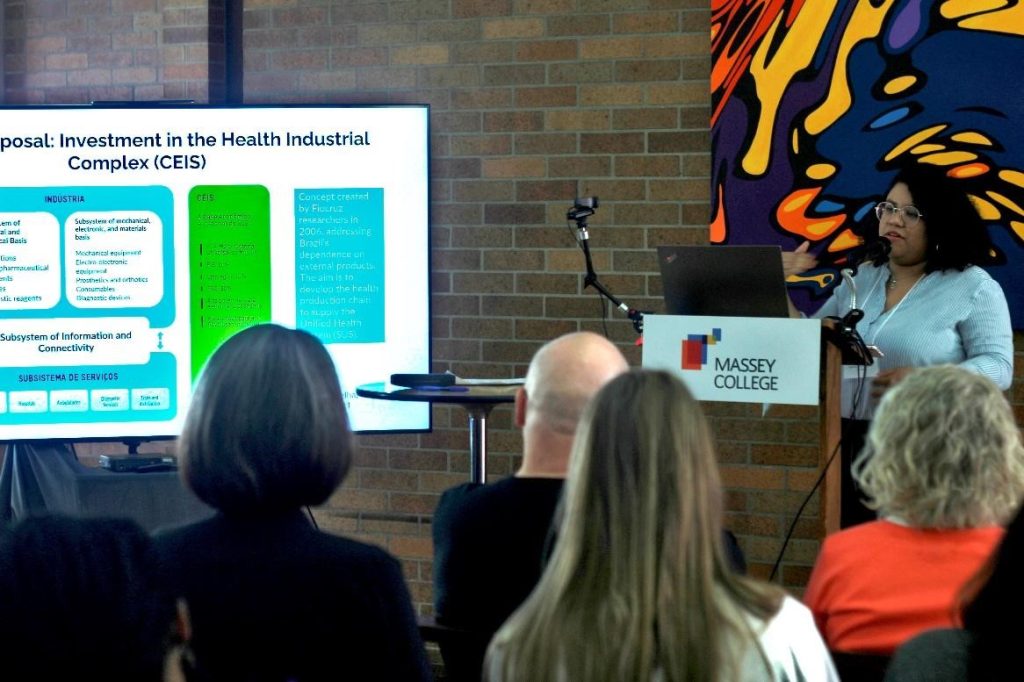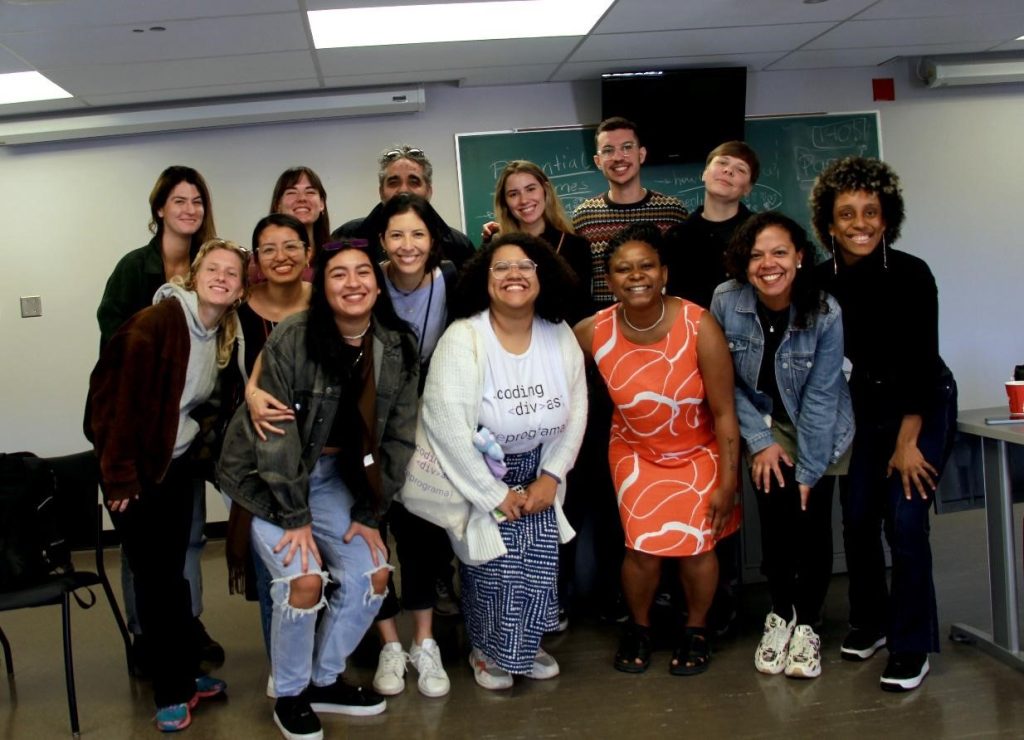
Transatlantic Conference: Community Engagement and Local Knowledge are Crucial to Pandemic Response
Incorporating the role of community mobilization and community-engaged research as a critical component to respond to future pandemics and public health emergencies: this was identified by researchers from four countries who came together for a conference at the University of Toronto from October 1 to 3, 2024.
Authors (in alphabetical order): Megan Botha (MA, Social Justice and Community Engagement), Ximena Gutiérrez (MA, Social Policy and Social Project Management), Theresa Martens (PhD candidate, Critical Urban Geography, University of Münster) Cristiane Pereira (PhD candidate, International Relations, University of São Paulo), Paulo Trivellato (PhD candidate, Global Health and Sustainability, University of São Paulo)
The conference "Exploring International Pandemic Responses through a Social Science Lens: Decolonial Paradigms and Solidarity Networks" brought together scholars, community researchers, and community leaders from various countries. Supported by an Institute for Pandemics (IfP) Knowledge Mobilization Grant, the conference was organized by the research partnership “Social Mobilization as Policy-Making Lever? (SMAPL), a trans-Atlantic COVID-19 dialogue on community action and decentralized governance”, which includes research teams from Canada, Peru, Germany, and Brazil. A key component of this partnership has been the establishment of a transnational Trainee Network, comprising 12 graduate (and a few upper-level undergraduate) students, along with two postdoctoral researchers. Below, we share reflections from five of these trainees on their involvement in the research project and the conference.
The event was inaugurated with a decolonial walking tour of Tkaronto, led by U of T Professor Jon Johnson and philosophy and Indigenous studies student Drew Rickard at First Story Toronto. For almost 30 years, First Story has continually engaged in the preservation of the deep Indigenous history that marks the city, yet is erased by dominant accounts. One highlight of the tour was learning about Cree artist Tannis Nielsen, whose murals are beautifully displayed along the walls of the Lower Simcoe Street underpass. These artworks are dedicated to the Water Walkers, Gchi-twaa-wendan Nibi (Honour the Water), and Elders who have lived in Toronto, ‘N’ gekaajig kidowog (My Elders Said).
Over the following days, the SMAPL team, featuring trainees, faculty, and community researchers, presented their research findings on local responses to the COVID-19 pandemic, emphasizing the role of social mobilization in these efforts. Ten University of Toronto professors served as discussants, fostering interdisciplinary dialogue regarding points of convergence and tensions among the case studies. We extend our gratitude to Antonio Torres-Ruiz (Political Science), Luis Van Isschot (History and Latin American Studies), Rupaleem Bhuyan (Social Work), Zubairu Wai (Global Development Studies and Political Science), Roberta Timothy (Social & Behavioural Health Sciences), Leslie Chan (Global Development Studies and Media Studies), Suzanne Sicchia (Health and Society), Bianca Dahl (Medical Anthropology), Nino Bariola (Culinaria Research), and Ryan Isakson (Global Development Studies and Geography) for their invaluable contributions. Likewise, we sincerely appreciate Anne-Emanuelle Birn, the lead PI for SMAPL and for the SSHRC and University of Toronto grants supporting the conference, for her role in organizing and facilitating the conference. Her dedication enabled us as students to actively engage in the program's development and contribute our unique perspectives. The SMAPL trainee network was the brainchild of Professor Jeannie Samuel (York University), and we are also deeply grateful for her guidance.
A standout moment at the conference was Professor Deisy Ventura's keynote, in which she explored how Transitional Justice concepts—Memory, Truth, Justice, and Reparation—can be adapted for pandemic accountability, drawing from her experiences leading a Brazilian Senate-commissioned report documenting extensive evidence of the Bolsonaro government’s deliberate plans to spread COVID-19 in Brazil. A key learning from her talk is that highlighting innovative community-focused responses does not absolve politicians of their responsibilities or of national and subnational governments of their role in ensuring universal health and social protections.
Community-Engaged Research
After the extensive sharing and learning about both the health inequities and the deep community engagement and advocacy evidenced in each of the case studies from both Global South and North settings, we as trainees contemplated how we might implement our decolonial aspirations and community-based approach into practice. This was crystallized in three observations: Firstly, we recognized a need to diversify our methods by using more creative and less academically heavy approaches in order to enhance accessibility for community-engaged participants and advocates. Secondly, it is crucial not only to reflect upon but also to seek to transform the relationships between researchers from (neo-)colonial institutions and local communities and civil society organizations. This involves maintaining these commitments over the long term and fostering multidirectional learning to ensure collective and community-driven understanding and mutual shaping of both immediate and future goals. Thirdly, as emerging researchers, we need to imagine further ways of engaging in social and political transformations and how to maintain these continuities by nurturing relationships with local governments and civil society/local advocacy groups, thereby contributing to change –that is, health justice– in the social realities faced.
A highlight from the conference was sparked by a question from DSLPH Professor Roberta Timothy, one of our discussants. After listening to presentations on community-organized social/political resistance to neoliberal/racial capitalist imperatives in Brazil and Germany, Roberta asked how the speakers’ positionality played into their research.
This led to unexpected personal-political disclosures: Cristiane Pereira discussed how her identity as a Black person has affected her understanding of neglect and violence, furthering her commitment to respecting communities’ agency, and the importance of consistently engaging marginalized knowledge in the research process. Prof. Christiane Falge, meanwhile, addressed how the silences around, and discovery of, the history of her family's participation in the Nazi regime has influenced her own motivations and approaches to community-engaged research with Muslim immigrants from Afghanistan and Syria. Both speakers’ candid reflections deepen our understanding of the ways in which experiences of both privilege and marginalization shape the research process.

Community Mobilization and Grassroots Activism as Policy Levers during the Pandemic
Throughout the conference, many discussions revolved around the importance of community mobilization, and how experiences of engaged participation and social representation could, but typically did not, influence the design of public policies. For us it became evident that in every setting, communities stepped in to address the gaps created by inadequate or absent government responses to COVID-19. Various presenters discussed the role of grassroots activism in promoting food justice and defending fundamental rights. For example, the relentless struggle for migrant workers’ rights to legal status in Canada was compellingly conveyed by Justicia for Migrant Workers activist Gabriel Allahdua, prize-winning author of Harvesting Freedom, a first-hand account of the exploitation he experienced as a migrant agricultural worker from St Lucia, and of his journey as an activist.
During the pandemic, community members active in grassroots movements provided and facilitated essential services (such as medical support and food security) for marginalized groups and laid the foundation for public policy advocacy, seeking to incorporate community needs and voices. That is why it was even more important that, during the conference, we had the opportunity to visit two community-based organizations implementing these strategies before, during, and after the pandemic: "5N2 Food for All" a food justice initiative in Scarborough, and "Spectre de Rue" in Montréal, which focuses on harm reduction and prevention associated with drug use. The international trainees’ post-conference visit to Université de Montréal, allowed us to witness community health activism firsthand and to discuss and integrate key themes identified in Toronto, further enriching the dialogue sparked by the conference and our larger research interchanges.
Decolonial Practices and Community-Driven Solutions: Reflections on a Transformative Conference
For members of the Trainee Network, the conference was a powerful experience that highlighted the transformative potential of decolonial practices and community-driven approaches in addressing global health challenges. By bringing together scholars, community researchers as well as community leaders, it created a meaningful space for exchange and collaboration. It emphasized the importance of amplifying voices often excluded from academic discourse, while visits to Canadian community organizations revealed urban challenges and innovative responses shared across the four countries.
We know we are still far from creating a bona fide decolonial conference, but we were particularly inspired by the emphasis on addressing structural inequalities and challenging entrenched norms. Discussions around grassroots mobilization, community activism, and social resistance provided us with actionable insights for building equitable and community-centered solutions in both research and practice. We think such collaborative spaces are vital for fostering solidarity and driving systemic change, especially within academic settings.

